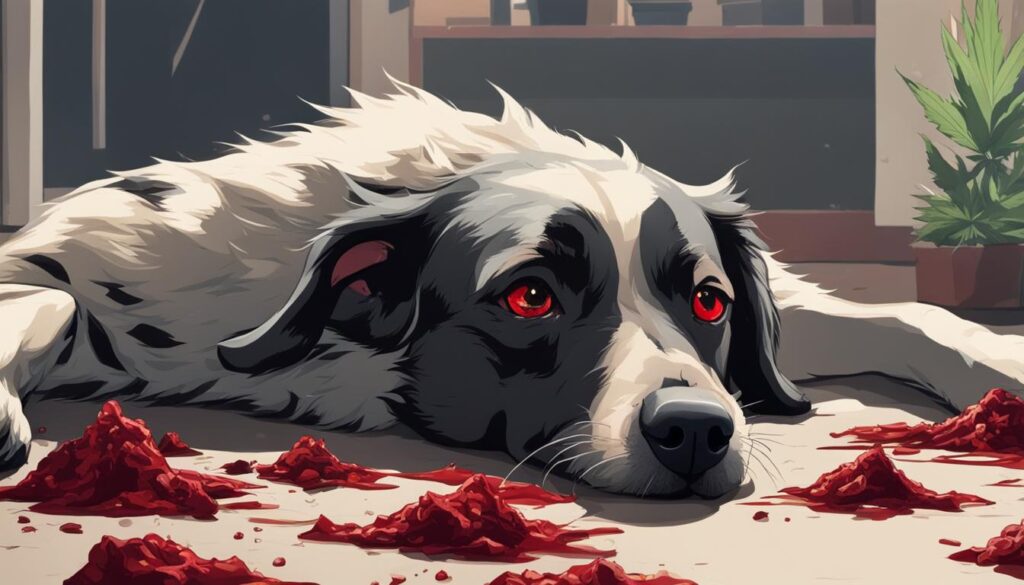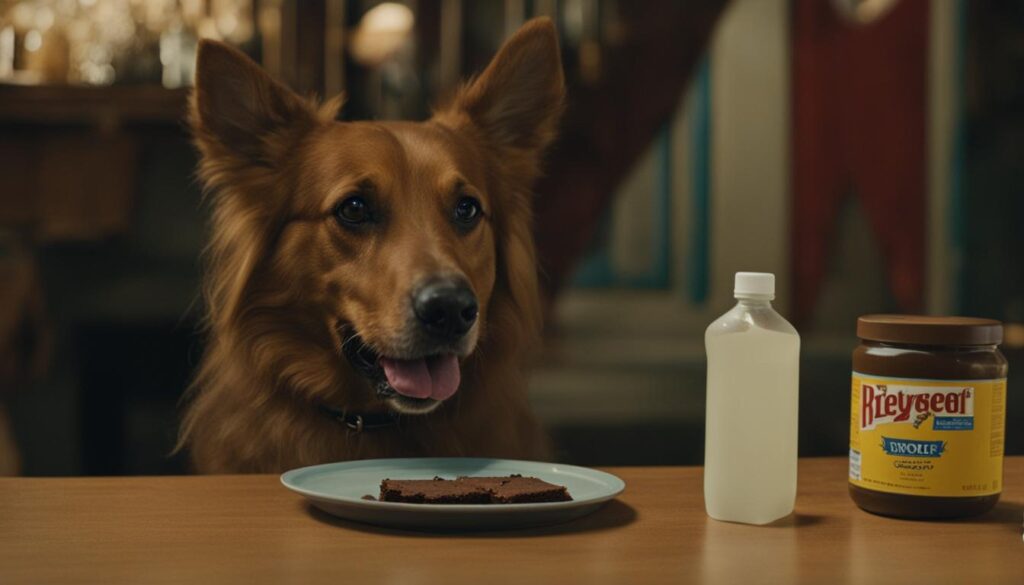As a dog owner, it can be distressing to discover that your furry companion has been exposed to cannabis and is feeling the effects of being stoned. However, with the right knowledge and prompt action, you can help your dog regain sobriety and ensure their well-being. In this quick guide, I will provide you with 10 step-by-step techniques, natural remedies, and dog recovery methods to assist you in unstoning your beloved pet.
It's important to note that cannabis intoxication in dogs can have serious health implications and should not be taken lightly. By following the tips and techniques outlined in this guide, you can reverse the effects of cannabis on dogs and help them detoxify their system safely and effectively.
Key Takeaways:
- Learning how to get a dog unstoned involves taking immediate action and seeking veterinary care.
- Create a safe environment for your dog's recovery, minimizing stress and providing comfort.
- Encourage natural elimination processes and offer appropriate nutritional support during detoxification.
- Understand the role of veterinary care in the unstoning process and follow their recommendations.
- Take preventative measures to keep your dog safe, secure hazardous substances, and educate household members.
Understanding Dog Cannabis Intoxication
When it comes to dog cannabis intoxication, it's essential to have a comprehensive understanding of its effects on our furry friends. Marijuana can have both physical and psychological effects on dogs, making it crucial for pet owners to be well-informed.
The dangers of cannabis exposure to dogs cannot be underestimated. While many people might assume that dogs can handle marijuana just like humans, the truth is that their bodies react differently to THC, the active compound in cannabis. THC can have a potent impact on dogs, leading to canine intoxication and various symptoms.
It is vital for pet owners to recognize the symptoms of stoned dogs. These symptoms can vary depending on factors such as the dog's size, the amount of cannabis ingested, and the potency of the marijuana. Common symptoms of dog cannabis intoxication include:
- Lethargy and decreased activity
- Disorientation and confusion
- Wobbliness or difficulty walking
- Vomiting and loss of appetite
- Changes in behavior or unusual reactions
- Slow or irregular breathing
- Dilated pupils
Understanding the effects of marijuana on dogs is crucial for pet owners, as it helps them recognize the signs of cannabis exposure and take immediate action to ensure their dog's well-being. The image below provides further insight into dog cannabis intoxication:
| Effects of Marijuana on Dogs | Symptoms of Stoned Dogs | Dangers of Cannabis Exposure to Dogs |
|---|---|---|
| Physical and psychological effects | Lethargy, disorientation, wobbliness, vomiting, loss of appetite, changes in behavior, slow or irregular breathing, dilated pupils | Potential toxicity and risks associated with marijuana ingestion |
| THC effects on dogs |
In the next section, we will explore the symptoms of marijuana exposure in dogs in more detail, ensuring that pet owners can quickly identify if their dog has ingested cannabis and take the necessary steps to address the situation.
Symptoms of Marijuana Exposure in Dogs


In this section, we will discuss the symptoms of marijuana exposure in dogs. It is important for pet owners to be aware of these signs in order to identify if their dog has ingested marijuana and take immediate action.
When a dog is exposed to marijuana, they may exhibit various symptoms of intoxication. These can include:
- Lethargy: Dogs may appear tired or lack energy.
- Disorientation: Dogs may seem confused or have trouble with coordination.
- Wobbliness: Dogs may have difficulty walking or maintaining balance.
- Vomiting: Dogs may experience nausea and may vomit.
- Loss of appetite: Dogs may show a decreased interest in food.
- Changes in behavior: Dogs may exhibit unusual behavior or seem more anxious or agitated.
- Slow or irregular breathing: Dogs may have abnormal breathing patterns.
- Dilated pupils: Dogs' pupils may appear enlarged.
It is important to note that these symptoms can vary depending on the amount of marijuana ingested, the size and weight of the dog, and the dog's individual sensitivity to the drug.
If you observe any of these symptoms in your dog and suspect they have been exposed to marijuana, it is crucial to seek immediate veterinary care. Cannabis poisoning in dogs can be serious and prompt action is necessary to ensure the well-being and safety of your pet.
Remember, being aware of the symptoms of marijuana exposure in dogs is essential for prompt intervention and effective treatment. Stay vigilant and prioritize your pet's health and safety.
Immediate Actions to Take if Your Dog is Stoned


If you suspect that your dog has ingested marijuana or is experiencing cannabis intoxication, it is crucial to take immediate actions to ensure their safety and well-being. Here are the steps you should follow:
Remain Calm and Act Quickly
First and foremost, it's essential to remain calm. Panicking can only escalate the situation and hinder your ability to help your dog effectively. Take a few deep breaths to calm yourself before taking any action. Acting quickly is important as it allows you to address the situation promptly.
Isolate Your Pet from the Substance
Isolating your dog from the substance is crucial to prevent any further ingestion. Remove your dog from the area where they were exposed to marijuana to minimize further exposure. This will help reduce the risk of additional intoxication and allow you to focus on helping your dog.
Monitoring Symptoms and Seeking Veterinary Care
After isolating your dog, closely monitor their symptoms. Look out for signs of cannabis intoxication, such as lethargy, disorientation, vomiting, or changes in behavior. If you notice any severe symptoms or if your dog's condition worsens, it is crucial to seek immediate veterinary care. A professional can assess the situation and provide the necessary treatment.
Remember, it is important not to try to treat your dog on your own or administer any medication without veterinarian guidance. Veterinary care is essential to ensure your dog's safety and to provide appropriate treatment.
How to Get a Dog Unstoned


In this section, I will provide you with a step-by-step guide on how to get a dog unstoned after cannabis intoxication. It's important to approach the situation calmly and take the necessary actions to ensure your dog's recovery. Remember, it's always best to consult a veterinarian for professional guidance throughout the process.
Stay Calm
First and foremost, it's crucial to remain calm when you suspect that your dog has been stoned. Your dog can pick up on your emotions, so staying calm will help maintain a sense of stability and reassurance.
Observe Symptoms
Take a moment to observe your dog's symptoms. Symptoms of cannabis intoxication in dogs may include lethargy, disorientation, wobbliness, vomiting, loss of appetite, changes in behavior, slow or irregular breathing, and dilated pupils.
Isolate the Dog
Once you've identified the symptoms of marijuana exposure, it's important to isolate your dog from the substance. Remove any remaining cannabis products from your dog's environment to prevent further ingestion.
Contact a Veterinarian
Contact your veterinarian immediately. They will provide you with professional guidance on how to proceed and may request additional information about your dog's exposure. It's essential to follow their advice throughout the recovery process.
Do Not Self-Medicate
Avoid self-medicating your dog. Some owners may be tempted to try home remedies or over-the-counter medications, but it is best to rely on the expertise of a veterinarian. They can provide the appropriate treatment and ensure your dog's safety.
Collect Information
When speaking with your veterinarian, be prepared to provide details about your dog's cannabis exposure. This information will help them assess the situation accurately and determine the best course of action.
Transport Safely
If your veterinarian advises bringing your dog in for examination and treatment, ensure their safe transportation. Use a secure and comfortable carrier or restrain them properly in the car to prevent any further stress or injury.
Be Honest with the Vet
Be open and honest with your veterinarian about your dog's cannabis exposure. They are there to help and need all the relevant information to make the best decisions for your dog's recovery.
Follow Vet Recommendations
Listen to your veterinarian's recommendations and follow their instructions carefully. They will provide you with a tailored plan for your dog's recovery, which may include medication, supportive care, and follow-up appointments.
Prevent Future Incidents
Take preventive measures to avoid future incidents of cannabis intoxication in your dog. Secure hazardous substances, educate household members and visitors about the dangers of cannabis to pets, and ensure proper disposal of cannabis products.
By following these steps and seeking professional help, you can help your dog sober up and ensure a safe and successful recovery.
Creating a Safe Environment for Recovery
After cannabis exposure, it is crucial to create a safe environment that promotes the recovery and well-being of your stoned dog. By minimizing stress and anxiety, providing light meals and dietary considerations, and ensuring comfort and hydration, you can help your dog relax and recover effectively.
Minimizing Stress and Anxiety
Stoned dogs may experience increased anxiety and stress. To reduce these negative emotions, create a quiet and calming environment for your dog. Find a cozy and comfortable space where your dog can rest undisturbed. Use soft bedding and provide familiar toys or blankets to promote a sense of security. Minimize loud noises, bright lights, and excessive activity in the environment to create a peaceful atmosphere.
Light Meals and Dietary Considerations
During the recovery process, it's important to consider the dietary needs of your stoned dog. Offer light meals that are easy to digest to avoid further gastrointestinal distress. Opt for bland foods such as cooked chicken or rice, which can be gentle on the stomach. Avoid feeding your dog fatty or spicy foods that may exacerbate symptoms. Consult with your veterinarian for specific dietary recommendations based on your dog's condition and needs.
Keeping Your Dog Hydrated and Comfortable
Hydration is crucial for a stoned dog's recovery. Make sure your dog has access to fresh water at all times and encourage frequent drinking. Monitor your dog's water intake to ensure they stay properly hydrated. Additionally, provide a comfortable resting area with adequate ventilation to help regulate their body temperature. Consider using a fan or providing a cool and shaded space during warmer weather.
| Creating a Safe Environment for Recovery |
|---|
| Minimize stress and anxiety |
| Provide a quiet and calming environment |
| Use soft bedding |
| Offer familiar toys or blankets |
| Avoid loud noises and bright lights |
| Offer light meals |
| Opt for bland foods |
| Avoid fatty or spicy foods |
| Ensure access to fresh water |
| Monitor hydration |
| Provide a comfortable resting area |
| Regulate body temperature |
Detoxifying a Dog's System Naturally
Encouraging Natural Elimination Processes
After cannabis exposure, it is important to support your dog's natural elimination processes to help them eliminate cannabis from their system. Encouraging regular urination and bowel movements can aid in the detoxification process. Take your dog for regular walks to stimulate their bladder and bowel movements. Providing ample opportunities for them to relieve themselves can help remove the toxins from their body.
Additionally, ensure that your dog has access to fresh water at all times. Proper hydration is essential for flushing out the toxins from their system. Encourage your dog to drink water regularly to support their natural elimination processes.
The Role of Nutritional Support During Detoxification
Proper nutrition plays a crucial role in supporting your dog's detoxification process. Feed your dog a balanced and wholesome diet rich in essential nutrients. Incorporate foods that are known to support detoxification, such as leafy greens, fresh fruits, and vegetables.
You can also consider adding supplements that support liver function and overall detoxification, such as milk thistle or dandelion root. These supplements can help enhance your dog's natural detoxification processes and support their overall health.
By encouraging natural elimination processes and providing nutritional support, you can assist your dog in safely and effectively detoxifying their system after cannabis exposure.
The Role of Veterinary Care in Detoxification
In the process of detoxifying stoned dogs, veterinary care plays a crucial role in ensuring the safe and effective recovery of our furry companions. A veterinarian's expertise and guidance are essential in providing the necessary medical treatment and support for dogs that have been exposed to cannabis.
When a dog is stoned, professional dog detoxification becomes imperative to address the negative effects of cannabis exposure. Veterinarians are trained to understand the specific medical needs of dogs and can tailor treatment plans accordingly. They can conduct thorough examinations to assess the dog's condition and determine the appropriate medical interventions.
The prowess of veterinary professionals in unstoning dogs cannot be overstated. Their knowledge of canine physiology and toxicology enables them to identify and treat the symptoms of cannabis exposure, promoting a safe recovery process.
Veterinary care for stoned dogs may involve different modalities, such as administering specific medications to counteract the effects of cannabis and alleviate symptoms. Additionally, veterinarians can provide advice on supportive care measures that can facilitate the detoxification process.
Not only do veterinarians play a crucial role in the immediate treatment of stoned dogs, but they also serve as trusted resources for pet owners. They can offer guidance on how to care for a dog during the recovery period and provide recommendations for creating a safe and conducive environment for detoxification.
By seeking professional dog detoxification through veterinary care, dog owners can ensure that their pets receive the appropriate medical attention and support needed for a smooth and successful unstoning process. It is important to remember that self-medication or relying on unverified remedies can be dangerous and may further compromise the dog's health.
In summary, the involvement of a veterinarian in unstoning a dog is crucial for providing professional medical treatment, comprehensive care, and guidance throughout the detoxification process. Their expertise and support significantly contribute to the well-being and recovery of stoned dogs.
Preventative Measures to Keep Your Dog Safe
In order to prevent dog cannabis intoxication and ensure the safety of our furry friends, it is crucial to take proactive measures. By securing hazardous substances, educating household members and visitors, and properly disposing of cannabis products, we can significantly reduce the risk of our dogs being exposed to these dangerous substances.
Securing Hazardous Substances
One of the most effective ways to prevent dog cannabis intoxication is by securely storing marijuana and related products. Ensure that these substances are kept in designated areas that are inaccessible to your dog. Consider using childproof containers, locked cabinets, or high shelves to keep them out of reach.
Educating Household Members and Visitors
It is essential to educate everyone in your household, as well as any visitors, about the dangers of cannabis exposure to pets. Make sure they understand the potential risks and the importance of keeping these substances away from dogs. By raising awareness and promoting responsible behavior, we can create a safer environment for our furry companions.
Proper Disposal of Cannabis Products
When it comes to disposing of cannabis products, we must be diligent to protect our dogs. Always follow local regulations and guidelines for proper disposal methods. Ensure that any leftover cannabis, edibles, or other related products are securely sealed and placed in a designated disposal container. Avoid throwing them in regular trash bins or leaving them within your dog's reach.
| Preventative Measures | Key Points |
|---|---|
| Secure Hazardous Substances | – Store marijuana and related products securely in locked cabinets or high shelves – Use childproof containers to prevent access |
| Educate Household Members and Visitors | – Raise awareness about the dangers of cannabis exposure to pets – Promote responsible behavior |
| Proper Disposal of Cannabis Products | – Follow local regulations for disposal methods – Seal leftover cannabis and related products securely – Use designated disposal containers |
Conclusion
In conclusion, getting a dog unstoned after cannabis intoxication requires immediate action and proper care. Throughout this guide, we have highlighted the key steps to help your furry companion recover from the effects of marijuana exposure.
Remember, taking immediate action is crucial. Remain calm and isolate your dog from the substance to prevent further ingestion. It is important to monitor the symptoms closely and seek veterinary care to ensure professional guidance throughout the recovery process.
Creating a safe environment for your dog's recovery is essential. Minimizing stress, offering light meals, and keeping your dog hydrated and comfortable can go a long way in supporting their sobriety. Additionally, it is important to follow the veterinarian's recommendations and take preventive measures to keep your dog safe in the future.
In conclusion, by acting swiftly, providing necessary care, and adopting preventive measures, you can help your dog regain sobriety and ensure their well-being. Remember, your furry friend relies on you for their safety and health. Take the necessary steps to get your dog unstoned and keep them protected from cannabis intoxication.
FAQ
What are the steps to get a dog unstoned?
Stay calm, observe the symptoms, isolate the dog, contact a veterinarian, do not self-medicate, collect information, transport safely, be honest with the vet, follow vet recommendations, and take preventive measures.
What are the dangers of cannabis exposure to dogs?
Cannabis exposure can cause physical and psychological effects in dogs, including lethargy, disorientation, wobbliness, vomiting, loss of appetite, changes in behavior, slow or irregular breathing, and dilated pupils.
What should I do if my dog ingests marijuana?
If your dog ingests marijuana, remain calm, isolate your pet from the substance, monitor symptoms, and seek veterinary care immediately.
How do I create a safe environment for my dog's recovery?
Create a quiet and calming environment, offer light meals, consider dietary needs, keep your dog hydrated, and ensure their overall comfort during the recovery period.
Are there any natural methods to detoxify a stoned dog's system?
Yes, you can encourage natural elimination processes such as urination and bowel movements, and provide nutritional support to aid in detoxification.
What is the role of veterinary care in detoxifying a stoned dog?
Veterinary care is crucial in providing medical treatment and support for dogs recovering from cannabis exposure. A veterinarian can offer expert guidance to ensure a safe and effective recovery.
How can I prevent cannabis intoxication in my dog?
You can secure hazardous substances, educate household members and visitors about the dangers of cannabis to pets, and properly dispose of cannabis products to prevent access by dogs.





